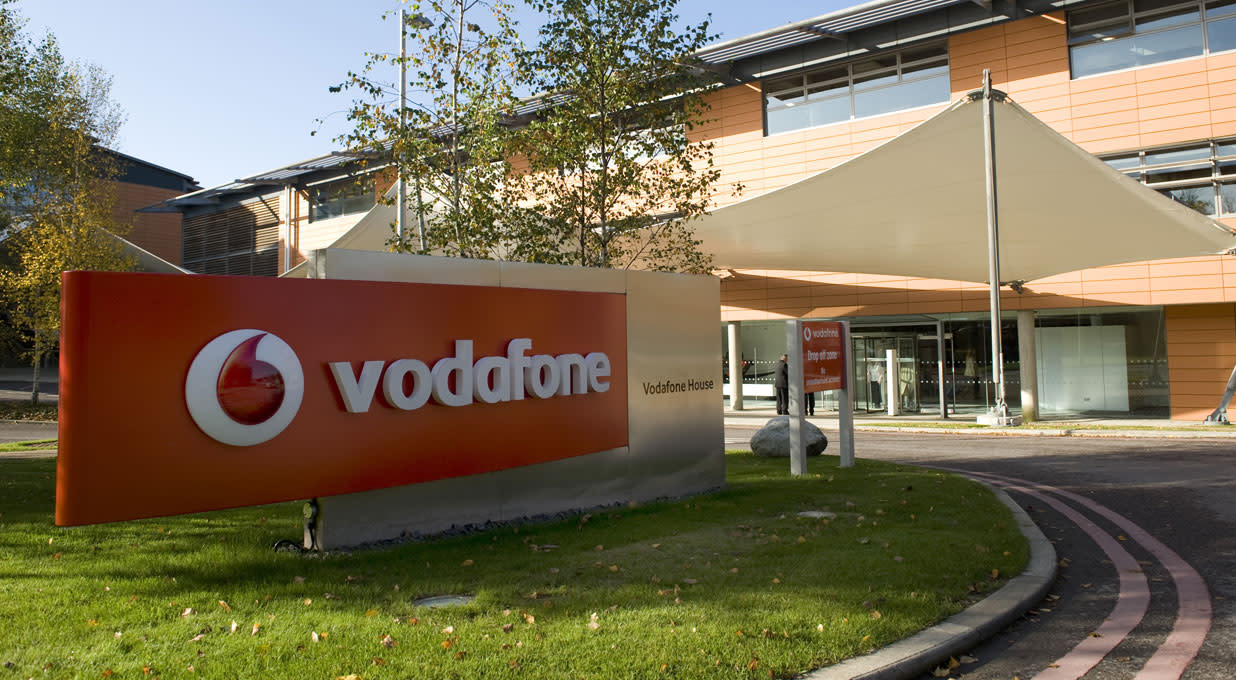Vodafone reported a 2.8% rise in first-quarter revenue to €9.0bn. Within that, Service revenue saw organic growth of 5.4% to €7.5bn, which was better than expected. All geographies saw top-line growth except for the largest region, Germany.
Underlying cash profit (EBITDAaL) saw organic growth of 5.1%, to €2.7bn. That was driven by revenue growth, lower inflation, and the favourable timing of some operating costs.
Full-year guidance is unchanged, pointing to underlying cash profit of around €11bn and underlying free cash flow of €2.4bn.
The shares were down 1.6% in mid-morning trading.
Our view
Vodafone's first quarter didn’t through up too many surprises. The new strategy, plus rightsizing of the business, are starting to bear some fruit. But there’s a long way to go.
Sales in the telecom sector should be relatively robust, as broadband and mobile services are hardly optional. Yet, over the last ten years, telecom giants have had to pump huge sums of cash into building out fibre networks and snapping up parts of the 5G spectrum. The main challenge has been the low sales growth relative to spending when you look at telecoms compared to other sectors.
Vodafone's also been underperforming versus its peers. Service revenue growth and customer satisfaction in key areas like Germany, Italy and Spain have struggled to keep pace.
In response, Vodafone has an evolved strategy. There are job cuts, the proposed merger of its UK business with Three UK, and the recently agreed sale of the underperforming Spanish and Italian divisions.
We welcome the change, but there's a lot to do.
The key market of Germany is a perfect example of the challenges at hand. After more than €20bn of investment, growing service revenue and customer numbers is proving a challenge. Vodafone was slow to adapt to changing regulations, and when it did, introduced a poor customer experience. There are further regulatory changes coming over this year which means Vodafone needs to recontract over 8.5mn customers (c. €800mn in revenue). It’s only expecting to retain around 50% of that, though that’s better than previously feared.
Outside Europe, the Vodacom subsidiary has some exciting growth opportunities in Africa and is targeting mid-to-high single-digit cash profit growth over the next few years. Africa could become increasingly important as the region develops, and Vodafone's leading position in several markets means it's well-positioned to benefit.
With around $12bn coming in from the planned sales, $4bn is pencilled for buybacks ($0.5bn has already been completed). We can only assume a decent chunk of the remainder will go on reducing debt. Key for shareholders will be the reduced dividend. At half last year’s level, this will be a hit to income investors, but still represents an attractive forward yield based on current prices. Rebasing was a good move in our eyes. Nothing is guaranteed.
All-in-all then, while we think the portfolio changes and new strategy make sense, the fundamental challenges that go with being a telecom remain. And with growth hard to come by, we'll need to see sustained positive progress before getting too excited.
Environmental, social and governance (ESG) risks
The telecom industry is low/medium in terms of ESG risk. Data privacy and security is the most significant risk driver, not only because customers are increasingly concerned about privacy, but also because cybersecurity breaches can be costly. Product quality is another key risk, particularly given the networks they manage are considered critical infrastructure. Carbon emissions, human capital and business ethics are also risks worth monitoring.
According to Sustainalytics, Vodafone’s management of material ESG issues is strong
Vodafone has a board-level ESG committee to oversee its ESG program and track key targets. Executive pay is partly based on ESG performance, with a 10% weight in long-term incentives. The company is certified for information security management, meeting industry best practices. Vodafone also has a third-party ethics hotline for anonymous reports and a specialist team for negotiations. However, the company has faced regulatory scrutiny and fines for quality and safety issues, indicating possible gaps in product governance.
Vodafone key facts
All ratios are sourced from Refinitiv, based on previous day’s closing values. Please remember yields are variable and not a reliable indicator of future income. Keep in mind key figures shouldn’t be looked at on their own – it’s important to understand the big picture.
This article is not advice or a recommendation to buy, sell or hold any investment.No view is given on the present or future value or price of any investment, and investors should form their own view on any proposed investment.This article has not been prepared in accordance with legal requirements designed to promote the independence of investment research and is considered a marketing communication.Non - independent research is not subject to FCA rules prohibiting dealing ahead of research, however HL has put controls in place(including dealing restrictions, physical and information barriers) to manage potential conflicts of interest presented by such dealing.Please see our full non - independent research disclosure for more information.


